What ails the UNP?
By Jaliya WIJEYEKOON
|
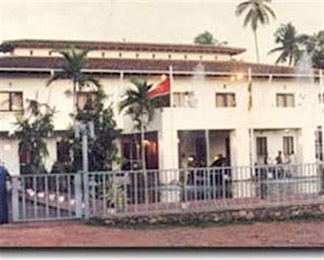
Sirikotha - UNP Headquarters
|
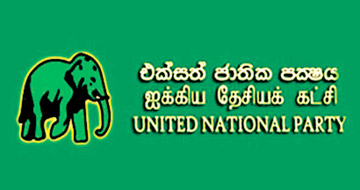 Wheels within wheels is what the United National Party (UNP) today.
Even to the hardcore partymen and to the neophyte alike what has
happened to the monolith UNP is the million dollar question. What has
gone wrong. Who should bear responsibility for this sorry state of
affairs? Will it ever rise from the ashes. Wheels within wheels is what the United National Party (UNP) today.
Even to the hardcore partymen and to the neophyte alike what has
happened to the monolith UNP is the million dollar question. What has
gone wrong. Who should bear responsibility for this sorry state of
affairs? Will it ever rise from the ashes.
The United National Party founded by D.S. Senanayake in 1946, had
been a formidable political force since its inception till 2001.
The United National Party had been headed by six leaders since its
formation and it had never bogged down in the opposition for more than
one parliamentary term until 2004.
First setback
The first defeat of the party suffered was in 1956 under the
leadership of Sir John Kothalawala, an arrogant and rigid leader who
have had constant conflicts even with the Maha Sangha. Following the
humiliating defeat he stepped down from the party leadership and
politics and lived in isolation till his death in 1979.
The United National Party bounced back to power in March 1960 only to
be defeated soon in July, the same year at the Throne Speech.
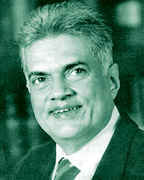 |
|
Ranil Wickremesinghe |
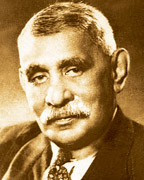
D.S. Senanayake |
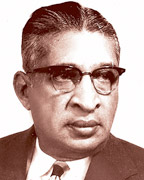
Dudley Senanayake |
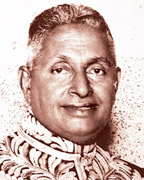 |
| Sir John
Kothalawala |
Dudley Senanayake and J.R. Jayewardene got together and revived the
party and formed a stable government in 1965. The party’s priority was
for a solid agricultural base with Dudley Senanayake’s Food Drive
Movement. Dudley strongly believed in promoting agriculture in the
country and his aim was to make the country self-sufficient in rice
production. Various programs were conducted in schools to instil the
concept in schoolchildren. However, at the subsequent election in 1970
the UNP was swept out of power reducing its strength to only 17 members
in the House. The relevant post mortem later revealed that Dudley’s
government was taken for a ride due to bureaucratic bungling.
The United Front (UF) Government headed by Sirimavo Bandaranaike
which received a two-thirds majority in 1970 rapidly became weak due to
its anachronistic economic policies which resulted in scarcity in
essential food items and day-to-day requirements.
Dudley Senanayake passed away in 1973 and the undisputed deputy
leader J.R. Jayawardene was unanimously elected leader from which point
the party was completely reorganised. A number of changes was effected
in the party mechanism to suit the prevailing political situation in the
country. J.R.J. Was the first leader who gave the pride of place to the
man in the street, as electoral organisers of the party and dispelled
the wrong notion among the UNP critics that UNP was Unge Nedeyange
pakshaya
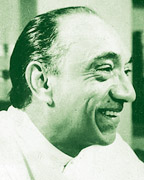
J.R. Jayewardene |
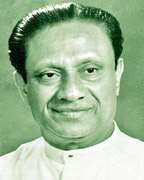
Ranasinghe Premadasa |
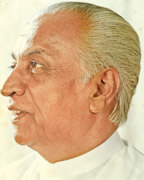 |
| D.B.
Wijethunga |
J.R. Jayawardene a far-sighted political visionary and a true
democrat rendered his unconditional support to the Sirimavo Government
when her government was threatened by undemocratic forces. When the UF
government extended its life span by two years JRJ mobilised all
progressive forces against the government and achieved an unprecedented
five sixth victory at the election held in 1977. All the candidates from
ordinary backgrounds that were fielded were successful and some of them
with huge majority votes. It was a political tsunami that defeated long
standing political stalwarts such as LSSP leader Dr. N.M. Perera and
Felix Dias Bandaranaike by mere political neophytes.
J.R. Jayawardene’s two terms of office could be considered an
epoch-making era in the annals of the country’s history as there was a
complete change in the socio-economic sphere of the country at the time.
The vast edifices of the Mahaweli Diversion scheme, Free Trade Zones,
the city of Jayawardenepura with its magnificent parliament, The
Jayawardenepura Hospital, The high-rise buildings and tourist hotels
that were built after the introduction of the free market economy and
shift from a stagnant socialist economy to a more liberalised one are
some of the main achievements which took place during his tenure of
office which ultimately resulted in consolidating the party membership
islandwide very strongly.
However, he weathered all political storms over certain critical
issues from within and without. He eventually overcame all opposing
forces and reached his goal tactfully.
The well consolidated United National Party continued in office
unabated till 1994 under two other leaders Ranasinghe Premadasa and D.B.
Wijethunga. However, during Ranasinghe Premadasa’s tenure there were
some dramatic changes in the party mainly due to his arrogant and
stubborn behaviour. Some of the party stalwarts broke away from the
party which ultimately affected the entire party mechanism. It is the
strong belief of political annalyists that the downfall of the United
National Party commenced with the formation of the Eagle party by Lalith
Athulathmudali and Gamini Dissanayake in 1992.
The United National Party suffered its worst setback from 1993-1994
losing all its prominent leaders such as Ranjan Wijeratne, Lalith
Athulathmudali, incumbent President Ranasinghe Premadasa, Gamini
Dissanayake and a host of other party stalwarts.
The United National Party was marginally defeated at General Election
in 1994 headed by Chandrika Bandaranaike Kumaratunga’s People’s Alliance
and the party was comprehensively defeated at the subsequent
Presidential Election.
Party leadership was vested on Ranil Wickremesinghe in 1994 and he
became the leader of the Opposition. He formed a government at the 2001
election with the support of a breakaway group from the ruling PA headed
by its General Secretary S.B. Dissanayake and six other vociferous
ministers. However, Ranil Wickremesinghe was unable to consolidate the
power he achieved and continue due to a number of reasons. Chandrika
Kumaratunga backed by the JVP dissolved the UNP government in two years
and the UNP was comprehensively defeated at the election held in 2004.
The rapid erosion of the United National Party commenced with the
2005 Presidential election and since then it had been a very pathetic
performance by the party at every subsequent election.
It has now come to a stage where the once formidable party has been
reduced to a mere nominal opposition in parliament. With the repeated
defeats suffered by the party the present leadership is challenged by
some party front-runners and it is quite evident that the party is
fragmented in to Ranil’s group, Sajith’s group and Karu’s group and so
on.
An independent analyst has viewed the present predicament of the
party after deeply scrutinising the vital issues and the manner in which
certain national and political affairs handled by the party hierarchy
had been some of the main reasons for its downfall.
The stand taken by Ranil Wickremesinghe’s government to solve the
North East problem never paid desired dividends. But it only aggravated
the situation and the Tigers became stronger while the government lost a
large number of men and machinery. When the present rulers had been
militarily crushing the Tigers, the UNP never supported its efforts but
tried to ridicule the government’s efforts. Most of the party men were
not happy with the situation and got themselves distracted from the
party.
Another main reason for the party’s defeat at the 2004 election was
the cessation of State employment by a government gazette notification
issued by Charitha Ratwatte, the Secretary to the treasury.
All the educated youth were dissatisfied with the decision and joined
the anti-government forces then.
The UNP does not possess an effective media unit to counteract the
allegations levelled against them from time to time and specially during
elections by the government.
The intra party conflicts have disintegrated the party membership and
hardcore UNP supporters have now become lethargic and lost hope.
the UNP’s failure to reach out to the masses in rural areas is yet
another major reason for the loss of rural vote base. There is no place
for upcoming youth in the party and the party high command was referred
as gerontocracy.
Internal divisions of the party over the accommodation of one-time
hardcore UNP critics without consulting the party membership has also
incurred the displeasure of some members.
The lack of an islandwide effective propaganda network is another
major setback for sorry state of affairs of the party. Party messages
are not correctly conveyed to the entire membership of the party
accurately and on time.
Former UNP veterans have completely disassociated themselves from the
party under the present dispensation.
According to independent political analysts it is not correct to
point an accusing finger at a particular individual for the repeated
defeats of the party but collective efforts have to be made by all
decision-makers of the party taking into consideration its lapses and
addressing all shortcomings with consultation compromise and consensus
of all stakeholders.
|


